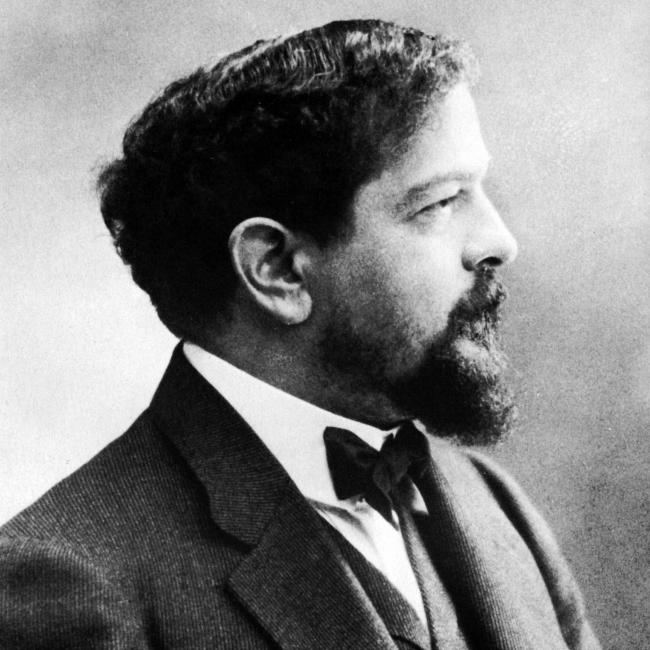
Debussy
Born: 1862
Died: 1918
Claude Debussy
Debussy was among the most influential of all the 20th century’s composers. His lyrical gift, idiosyncratic harmonies, colours and rhythms, his preference for suggestion rather than direct statement, resulted in a sound world that was quite different from those of Brahms, Wagner and Tchaikovsky, whose music ruled the roost while he was struggling to become accepted.
Explore...
Debussy’s Jeux: a complete guide to the best recordings
Debussy’s elusive ‘poème dansé’ stands at the intersection between late Romanticism and modernism. Richard Whitehouse follows its recorded progress over the past 75 years... Read more
The Debussy legacy
His use of colour influenced composers from Stravinsky to Boulez, but to call him an Impressionist misses the point finds Mark Pullinger, as he talks to musicians a century after the composer’s death... Read more
Top 10 Debussy recordings
Ten essential recordings to start exploring the works of Claude Debussy... Read more
Debussy: Playing with Colour
Debussy emancipated the orchestra, capitalising on its colours and freeing up its expressive potential. Geoffrey Norris talks to some of today’s leading Debussy interpreters about the ongoing resonance of his music... Read more
Classics reconsidered: Mitsuko Uchida's account of Debussy's Etudes
Bryce Morrison and Harriet Smith revisit the 1989 Philips recording of Debussy’s Etudes from Mitsuko Uchida... Read more
Podcast
François-Xavier Roth on Debussy's Pelléas et Mélisande
Biography
The refined taste and exquisitely coloured music of Debussy belonged to a man born above his parents’ china shop on the outskirts of Paris. Neither his mother nor father seems to have shown much interest in his development and it was his aunt Clémentine who was the one to notice his musical gifts. She kept a dress shop and, when she and her wealthy amour removed to Cannes in 1871, Debussy visited her there and had his first piano lessons. Back in Paris, he had further lessons from a pupil of Chopin. Just three years later he was good enough to play Chopin’s F minor Concerto, having entered the Paris Conservatoire aged 10. About the same time, he started to compose.
His teachers found him charming, while one fellow student described him as ‘uncommunicative, surly and not attractive to his friends’. His piano teachers were the finest and he was thought to be headed for a career as a virtuoso. Early on, his few intimates noticed his impeccable taste and quiet obstinacy. Later he would surround himself with fine books and pictures, dressing in beautifully cut clothes (usually sporting a broad-brimmed hat) and eating the best caviar, for he was something of a gourmet.
In 1880 Debussy was recommended as household pianist to Mme Nadezhda von Meck, Tchaikovsky’s patron. He was to teach her children and play four-hand piano music with them. He was not quite 18 at the time and travelled to Switzerland, Italy and Russia with the family, staying in Moscow and the family estate in the summers of 1881 and 1882. During 1881-84 he prepared himself for the Prix de Rome and won the much-coveted prize at the second attempt with the cantata L’enfant prodigue. At the Villa Medici in Rome he had the chance to meet Liszt. The great master introduced him to the music of Lassus and Palestrina (whose austere spirituality rubbed off on Debussy); Liszt’s subtle pedalling when he played the piano also gave him ideas.
Back in Paris in 1886, living with his parents, he fell under the influence of Wagner’s music, though he was to reject it fairly swiftly, with the exception of Parsifal, a work in which he delighted for the rest of his life. Other influences were at work which resulted in music that was to be the very antithesis of Wagnerianism. First there was the eccentric Erik Satie. He encouraged Debussy to write music that was not hidebound by academic tradition – ‘Break the rules, defy convention’ could have been his credo – and to find inspiration in the paintings of Claude Monet, Cézanne, Renoir, Pissarro and others. Three influential exhibitions from 1874 to 1877 had led to the term ‘Impressionism’ being used to describe their work. Edgar Allan Poe, too, fascinated him, as he did all the symbolist poets (for a while Debussy worked on an orchestral work based on The Fall of the House of Usher). Yet another influence on his development was the Exposition Universelle of 1889 where he first heard a Javanese gamelan orchestra and fell in love with its exotic textures and counterpoint to which, he said, ‘in comparison that of Palestrina is a child’s game’.
In the late 1880s he met up with Gabrielle Dupont – ‘green-eyed Gaby’. They lived in a shabby apartment in Montmartre while Debussy struggled to make ends meet. He wrote a String Quartet (1893) and the Prélude à L’après midi d’un faune the following year, the two works with which we may say that Impressionism in music was born. Gradually he began to make a name for himself. After 10 years, Gaby’s reward for her support and care while her lover established himself was to be thrown over in 1899 when Debussy upped and married Rosalie Texier. Gaby Dupont shot herself, survived and disappeared into oblivion. Only five years later, Debussy grew tired of Rosalie (‘the sound of her voice makes my blood run cold,’ he once said) and took up with Emma Bardac, the wife of a wealthy banker.
Debussy divorced in 1904 and married Emma in October 1905. Older than Debussy, she already had grown children; their only child together was born before Emma was divorced. This was Debussy’s adored Chouchou, to whom he dedicated his Children’s Corner suite. She died in 1919 aged 14.
By the turn of the century, Debussy’s music had begun to reach a wider public. His opera Pelléas et Mélisande was produced in 1902. Though controversial and opposed by Maeterlinck, on whose play the opera was based, it won him many admirers and made his name internationally famous. He received the Légion d’Honneur and was made an advisor on the board of the Conservatoire. Financially secure from his second marriage and with increasing success as a composer, Debussy had at last ‘arrived’.
He travelled all over Europe and (in 1913) even as far afield as Moscow and St Petersburg but from 1909 his health started to deteriorate. He suffered from frequent haemorrhages and in 1915 underwent an operation for bowel cancer. He had a second operation; radium and morphine were administered but it was no use. From the beginning of 1918 he could not leave his room and he died there at the end of March.

Gramophone Digital Club
- Digital Edition
- Digital Archive
- Reviews Database
- Events & Offers
From £9.20 / month
Subscribe
Gramophone Club
- Print Edition
- Digital Edition
- Digital Archive
- Reviews Database
- Events & Offers
From £11.45 / month
Subscribe
If you are a library, university or other organisation that would be interested in an institutional subscription to Gramophone please click here for further information.








